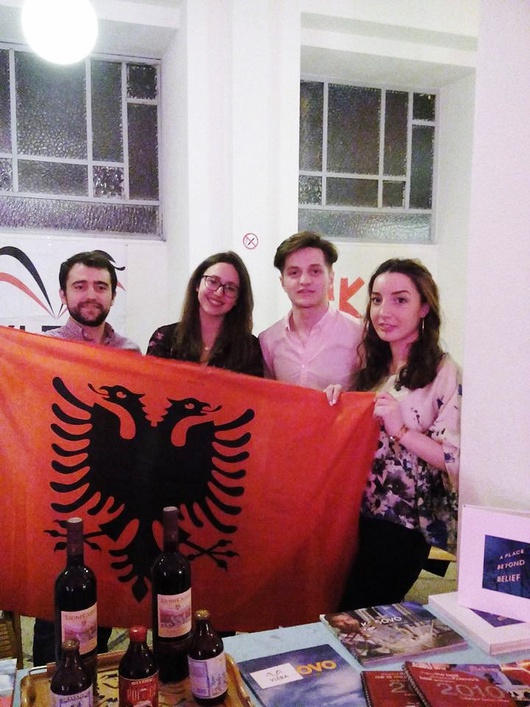![Image for [eng] Meeting the Albanian students of Belgium.](https://media.cafebabel.com/resized-images/49/f7/3755a945810d69cd298bb9cebd2696d5a87a.jpg)
[eng] Meeting the Albanian students of Belgium.
Published on
Translation by:
Andrew StarrAs it has every year for the last ten years, Bozar (the Centre for Fine Arts) in Brussels hosted the Balkan Trafik festival from the 14th to 17th April. Although artists were the principal theme at concerts and shows, several societies were also present. Among them was VLERA, the Albanian students' union.
In the middle of April, several hundred people once again descended on Bozar, for the tenth instalment of Balkan Trafik. This was a chance to show the Balkans and their culture from different angles, through traditional and modern music concerts, exhibitions and films.
Even though the most memorable and popular festival highlights were undoubtedly the concerts, no less than seven professional bodies came to show their projects to the people of Brussels. The most notable of those present were the International Civil Service, Le Courrier des Balkans (a French language newspaper), Gratiartis (an association for the promotion of multicultural activities) and VLERA, the Albanian students’ union of Belgium.
“We are part of the Mediterranean, so we are at the top in the field of gastronomy.”
Tibina and Bleona meet us at their stand and explain to us the activities the society they represent undertakes. VLERA’s goal at the heart of Belgian universities is to support Albanian students, to unite them and to organise different events in order to promote Albanian culture throughout the country. Therefore VLERA made the most of the opportunity that Balkan Trafik provided to familiarise the Belgians to their activities and to promote their country to the greater public.
The society came here, not just to introduce Albania, but also Kosovo, an independent country since 2008, their neighbour and inhabited in part by Albanians. At the stand there were tourist guides and maps of the two countries, along with local specialities in particular wine and beer from Kosovo. The chance for volunteers to introduce local cuisine. Tibina tells us “We are part of the Mediterranean, so we are at the top in the field of gastronomy. Even at a cultural level everything is very organic as the local farmers do not use any chemical products or pesticides.” 
Roland, Tibina, Dalip and Bleona in front of their stand.
“People ask us ‘Is it dangerous for tourists?’”
According the volunteers the majority of the questions asked by tourists are generally about tourism, with Albania being on the Adriatic coast and having a particularly rich cultural heritage. “They are very general things, there are few specific questions, because for Belgians it is still a relatively unknown country. People ask us ‘Is it a dangerous country for tourists?’ Of course it’s not, it’s a very open country, which is becoming known as a tourist destination, because we have remains which date back to before the Roman era and unspoiled countryside. Tourists should make the most of it now, as in a few years time this might no longer be the case.” Tibina added.
While it is true that the Balkans have been poorly covered in Western Europe’s traditional media, the refugee crisis has put certain countries from this region under the spotlight. However, according to Tibina whether it is about Kosovo or Albania, the festival goers’ questions were not about these issues. “We had no questions about the refugee crisis at all. As a general rule, they do not take the route through Kosovo or Albania, but more through Macedonia or Serbia.”
“We’re not here to talk politics, but to introduce our country through culture.”
However, the passers-by have other questions about Albanian society. During the presentations, some of them asked about religion. Belona says “We have no single religion. There are Catholics, orthodox Christians and Muslims. There’s a saying in Albania that says “Albanian faith is Albainity”. An example of this is my mother who’s a Muslim and my father a Christian. Different communities live well together.” This is the main message the volunteers want to communicate in their PowerPoint presentation about the country.
Even if religion does not seem to be an issue, they do admit that there are always tensions among the political order. Roland an Albanian student from Kosovo and Dalip a student born in the Albanian community of the Presheva Valley in Southern Serbia briefly raise the discrimination suffered by Albanians in Serbia, particularly in the field of education with the impossibility of getting books. Also in Macedonia the state is similar to Belgium according to them, with several different communities living together in the country. The volunteers are however not here to talk politics. As Roland says in conclusion, Politics is something that causes problems. We are not here to talk politics but to introduce our country through its culture.”
For more information on VLERA's activities, go to their site.
Translated from À la rencontre des étudiants albanais de Belgique



